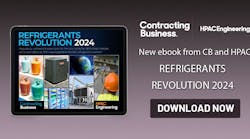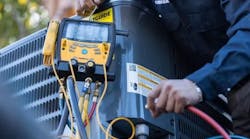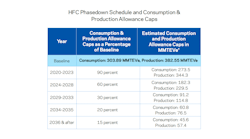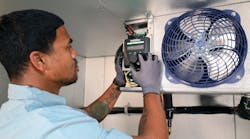The 2011 Refrigeration Service Engineers Society Annual Conference, held in early November in Norfolk, VA, was called "Making History." The mission was to encourage contractors to become motivated to make significant and "historic" changes in their businesses and destinies.
"The 74th RSES Annual Conference was a great success, as evidenced by a jump in overall attendance from 2010 by 25%," said Mark Lowry, RSES executive vice president, who added that more than 350 contractors, technicians, and students convened to learn from industry leaders during 39 educational sessions. Conference attendees learned about the latest developments in variable refrigerant flow technology, supermarket system design including carbon dioxide (CO2), ECMs in refrigeration, radiant heating design, and more.
The conference featured a day-long engineering track, with professional development hour credits for PEs, and a contractor track covering human resources, legal issues, and profitability basics. Early arrivals enjoyed an industry tour of the CBN thermal storage facility, and a visit to a Farm Fresh store, led by Jon Perry , Farm Fresh Supermarkets’ director of energy and maintenance. The store features cutting-edge technology and design, to achieve high efficiency and superior refrigerant leak detection.
The conference began with an inspirational message by Dr. Alan Krasnoff, mayor of Chesapeake, VA, aimed at helping contractors contribute to their individual histories, by realizing their potential.
"Don't define yourself by disfunction," Krasnoff said. "The only people who can bring you down are elevator operators. Just surviving isn't taking you to success. Change is a process, and you have a destiny. If you know you have a destiny, make some noise. Nobody is going to stop you when you realize you have a destiny."
Historically, the RSES conference has provided its HVACR contractor members with the latest product information from leading industry manufacturers. This year was no exception, as presenters from more than 40 manufacturers were on hand to offer technical advice.
Among the show's educational highlights was a presentation on supermarket refrigeration issues, co-hosted by Jon Perry and Keilly Witman, manager of the Environmental Protection Agency's voluntary GreenChill leak reduction initiative targeted to supermarkets.
Witman demonstrated GreenChill's new refrigerant leak calculator, which allows retailers to compare the cost of a refrigerant leak against the cost of product sold at retail. The calculator was developed to help supermarket managers see exactly how much refrigerant leaks cost their stores in product terms.
"Managers may know that they spend $24,000 replacing refrigerant each year because of leaks, but the contractor should put it in a different context, where the store managers can realize it more clearly," Witman said. "Tell them they have to sell about 19,000 gallons of milk to replace the cost of a 100-pound refrigerant loss."
The GreenChill leak calculator is free, and can be found at http://1.usa.gov/leakcalculator.
Perry, an innovator in store design, refrigerant leak detection, and refrigeration system maintenance, explained some of the design strategies incorporated into Farm Fresh stores. He explained how central monitoring is a key to designing a store for reduced leak rates. His methods include building automation tied in with electronic as-builts. A central monitoring center is staffed around the clock by five associates, who oversee a network of seven computers. Lighting fast leak detection is a major goal.
"Being quick to know when you have a leak is critical for reducing leak rates," Perry said. "Central monitoring receives data from infrared leak detectors, and our technicians respond to all calls within one hour." Farm Fresh mechanical rooms are contained and sealed at all times, to prevent outside air from interfering with leak detection efficacy.
"Older style motor rooms move about 20,000 CFM of air. When you stop moving air through the motor room it's a huge advantage to monitoring, and to finding a leak," Perry explained. "Small leaks can't be detected if exhaust air keeps moving through." Additionally, mechanical rooms in new Farm Fresh stores are built at ground level, on solid concrete, to greatly reduce vibration, reduce technician travel time, and eliminate weather factors.
The Contracting Business.com 2011 Commercial Refrigeration Contractor of the Year Award was presented to SCR, St. Cloud, MN. (see http://bit.ly/SCRinCB)









